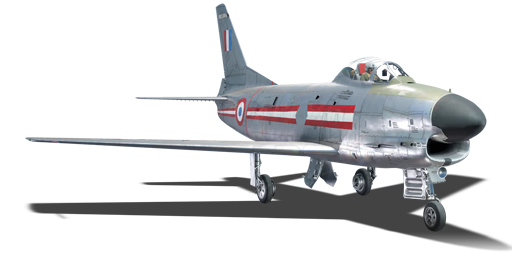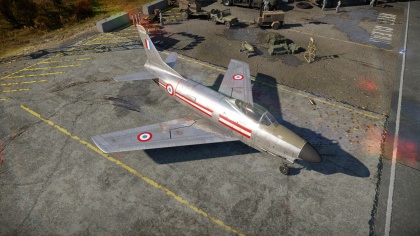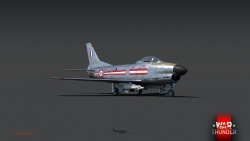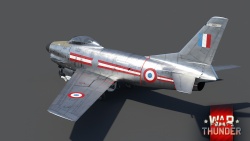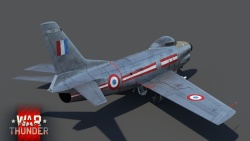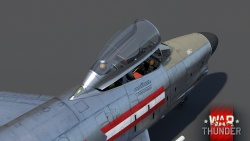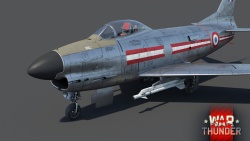F-86K (France)
Contents
| This page is about the French jet fighter F-86K (France). For other versions, see F-86 (Family). |
Description
The ▄F-86K Sabre is a rank VI French jet fighter
with a battle rating of 9.0 (AB/RB) and 9.3 (SB). It was introduced in Update 1.89 "Imperial Navy".
The original F-86D was developed as bomber interceptor and was outfitted with a retractable ventral rocket-rack which housed 24 x 2.75 in (70 mm) Mighty Mouse folding-fin aerial rockets. Lacking cannons or air-to-air missiles, the F-86D was limited in role strictly as a bomber hunter. In 1953 the Italians approached North American in an attempt to modify the existing F-86D into a fighter interceptor, however, the proposed changes proved too costly. This cost overage required scaling back the requirements and from this was produced the F-86K, a fighter interceptor aircraft which was outfitted with 4 x 20 mm cannons and two AIM-9B Sidewinder missiles. Originally this aircraft was produced for the U.S., however, later the Italian manufacturer Fiat was licensed to also manufacture and produce this version of the fighter.
|
Fun Fact: The Sabre Dog was initially to be designated F-95, but had its name changed to F-86D instead, in order to make it seem like a variant of the existing Sabre and not an entirely new aircraft. In reality however, the F-86D was only about 25% similar to the original F-86 and the name change was only done to secure further support for the project.
|
General info
Flight performance
Describe how the aircraft behaves in the air. Speed, manoeuvrability, acceleration and allowable loads - these are the most important characteristics of the vehicle.
| Characteristics | |||||||
|---|---|---|---|---|---|---|---|
| Stock | |||||||
| Max Speed (km/h at 0 m - at sea level) |
Max altitude (meters) |
Turn time (seconds) |
Rate of climb (meters/second) |
Take-off run (meters) | |||
| AB | RB | AB | RB | AB | RB | ||
| 1,103 | 1,097 | 15500 | 27.4 | 28.3 | 42.7 | 37.1 | 1,000 |
| Upgraded | |||||||
| Max Speed (km/h at 0 m - at sea level) |
Max altitude (meters) |
Turn time (seconds) |
Rate of climb (meters/second) |
Take-off run (meters) | |||
| AB | RB | AB | RB | AB | RB | ||
| ??? | 1,111 | 15500 | ??.? | 27.0 | ??.? | 56 | 1,000 |
Details
| Features | ||||
|---|---|---|---|---|
| Combat flaps | Take-off flaps | Landing flaps | Air brakes | Arrestor gear |
| ✓ | ✓ | ✓ | ✓ | X |
| Limits | ||||
|---|---|---|---|---|
| Wing-break speed (km/h) |
Gear limit (km/h) |
Combat flaps (km/h) |
Max Static G | |
| + | - | |||
| 620 | ~8 | ~4 | ||
| Optimal velocities | |||
|---|---|---|---|
| Ailerons (km/h) |
Rudder (km/h) |
Elevators (km/h) |
Radiator (km/h) |
| < 850 | < 600 | < 660 | N/A |
| Compressor (RB/SB) | ||
|---|---|---|
| Setting 1 | ||
| Optimal altitude | 100% Engine power | WEP Engine power |
| 0 m | 2,105 kgf | 4,098 kgf |
Survivability and armour
Examine the survivability of the aircraft. Note how vulnerable the structure is and how secure the pilot is, whether the fuel tanks are armoured, etc. Describe the armour, if there is any, and also mention the vulnerability of other critical aircraft systems.
Armaments
Offensive armament
The F-86K (France) is armed with:
- 4 x 20 mm M24A1 cannons, nose-mounted (132 rpg = 528 total)
Suspended armament
The F-86K (France) can be outfitted with the following ordnance:
- Without load
- 2 x AIM-9B missiles
Usage in battles
Describe the tactics of playing in an aircraft, the features of using aircraft in a team and advice on tactics. Refrain from creating a "guide" - do not impose a single point of view, but instead, give the reader food for thought. Examine the most dangerous enemies and give recommendations on fighting them. If necessary, note the specifics of the game in different modes (AB, RB, SB).
Radars
The F-86K is equipped with an AN/APS-21 search radar, located in the nose of the aircraft.
| AN/APS-21 - Target Detection Radar | |||
|---|---|---|---|
| Maximum Detection Range |
Guaranteed Detection Range |
Max Azimuth Scan Angle |
Max Elevation Scan Angle |
| 45,000 m | 28,000 m | ±85° | ±16° |
Manual Engine Control
| MEC elements | ||||||
|---|---|---|---|---|---|---|
| Mixer | Pitch | Radiator | Supercharger | Turbocharger | ||
| Oil | Water | Type | ||||
| Not controllable | Not controllable Not auto controlled |
Not controllable Not auto controlled |
Not controllable Not auto controlled |
Separate | Not controllable 1 gear |
Not controllable |
Modules
| Tier | Flight performance | Survivability | Weaponry | ||
|---|---|---|---|---|---|
| I | Fuselage repair | Offensive 20 mm | |||
| II | New boosters | Compressor | Airframe | AIM-9B | |
| III | Wings repair | Engine | New 20 mm cannons | ||
| IV | G-suit | Cover | |||
Pros and cons
Pros:
- Possesses payload of two air-to-air missiles AIM-9B Sidewinder
- Afterburner
- 20 mm cannon armament
- Has a search radar
- Good high-speed maneuverability
Cons:
- Maximum speed is subsonic
- As with nearly all jets, not very maneuverable at low speeds
History
In March 1949, the North American company launched the development of a new jet interceptor, based on the existing F-86 Sabre, as part of a private venture. The new design was the first interceptor developed to be operated by a single crew member and utilized unguided rockets in combination with a complex fire control system, rather than conventional guns, in order to destroy its target. Already by April, the project had received official endorsement from high-ranking military officials and development of a production version began in parallel.
While a production contract was signed in October, the first prototype, designated YF-95, conducted its maiden flight in December 1949. In the early ‘50s, Soviet nuclear testing and the subsequent start of the Korean conflict led to an accelerated development of the YF-95. Despite this, problems during development caused production to be delayed, resulting in the aircraft reaching its first units only in March 1951. During the delay however, the designation of the aircraft changed to F-86D and it received its unofficial nickname “Sabre Dog”.
In January 1953, North American was approached by an offer from the Italian military to develop a twin-seater version of the F-86D armed with cannons. As the cost and necessary redesign work turned out to be too great, an agreement was made to produce the aircraft in its original design, but with cannon armament and a simplified fire control system instead. This new export version of the Sabre Dog received the new designation of F-86K.
Initially, the F-86K was produced exclusively in the U.S., but would later also be manufactured under licence by the Italian Fiat company. The F-86 entered service in 1955 and apart from the Italian Air Force, the F-86K also served with many other operators worldwide including France, West Germany, the Netherlands, Norway, Honduras, Venezuela. Around 340 F-86Ks were produced out of over 2,800 Sabre Dogs built in total. Most of the F-86Ks would be decommissioned by the late ‘60s, while some even went on to serve into the ‘70s.
- From Devblog
Media
See also
Links to the articles on the War Thunder Wiki that you think will be useful for the reader, for example:
- reference to the series of the aircraft;
- links to approximate analogues of other nations and research trees.
External links
| France jet aircraft | |
|---|---|
| Fighters | M.D.450B Ouragan · M.D.450B Barougan · M.D.452 IIA · M.D.452 IIC · Mystere IVA · Super Mystere B2 |
| ▄F-86K · ▄F-100D · ▄F-8E(FN) | |
| Mirage IIIC · Mirage IIIE · Milan · Mirage 5F · Mirage 2000C-S4 · Mirage 2000C-S5 · Mirage 2000-5F · Mirage 4000 | |
| Mirage F1C · Mirage F1C-200 · Mirage F1CT | |
| Strike aircraft | ▄F-84F · F-84F IAF · ▄F-84G-26-RE |
| Etendard IVM · Super Etendard · Alpha Jet E | |
| Jaguar A · Jaguar E · Mirage 2000D-R1 · Mirage 2000D-RMV | |
| Bombers | S.O.4050 Vautour IIA · Vautour IIA IDF/AF · S.O.4050 Vautour IIB · S.O.4050 Vautour IIN · S.O.4050 Vautour IIN (late) |
| Belgium | ▄Meteor F Mk.8 · ▄Mirage 5BA · ▄F-104G · ▄F-16A · ▄F-16AM |
| Netherlands | ◘Sea Hawk Mk.50 · ◘Hunter F.6 |


